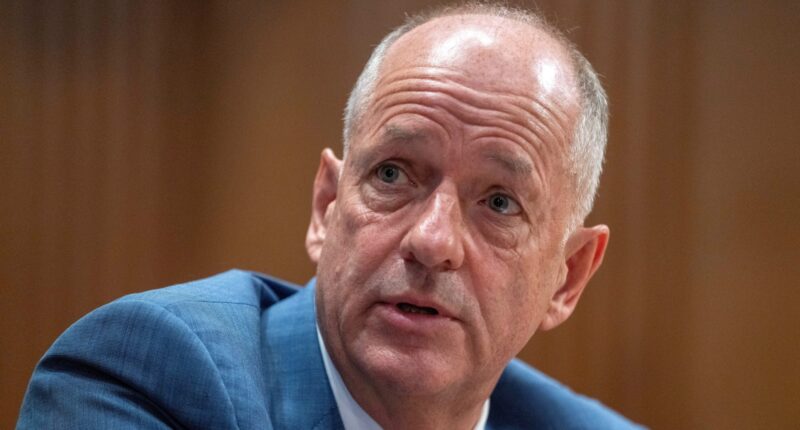CEO Andrew Witty from UnitedHealth Group acknowledged the imperfections in the US health system in response to public concerns following a tragic incident involving one of its executives. He highlighted that the decision-making process regarding coverage is often unclear.
Witty emphasized that the current health system is flawed and recognizes the frustrations people experience. He mentioned that the system has evolved over time into a disjointed structure that lacks a cohesive design.
While defending UnitedHealthcare, the company’s health insurance branch, Witty admitted that the organization bears some responsibility for the confusion surrounding care decisions.
“Together with employers, governments and others who pay for care, we need to improve how we explain what insurance covers and how decisions are made,” Witty wrote. “Behind each decision lies a comprehensive and continually updated body of clinical evidence focused on achieving the best health outcomes and ensuring patient safety.”

Witty also praised UnitedHealthcare CEO Brian Thompson, who was killed in midtown Manhattan last week, writing that Thompson “fought for preventive health and quality health outcomes rather than simply adding ever more tests and procedures.”
In a statement on Friday, UnitedHealthcare said “highly inaccurate and grossly misleading information has been circulated about our company’s treatment of insurance claims” and that it “approves and pays about 90% of medical claims upon submission,” noting that “around one-half of one percent are due to medical or clinical reasons.”
Will changes be made?
Thompson’s fatal shooting pushed Americans’ dissatisfaction with their health insurance into the spotlight. Many have made their frustrations abundantly clear on social media.
Journalists have also chronicled insurers’ efforts to twist the system to their benefit. STAT, a news site that focuses on health care, has published a series of investigative stories on UnitedHealth, including articles on how the nation’s largest health insurer uses a computer algorithm to cut off rehabilitation care for Medicare enrollees, limiting clinical case managers’ discretion.
Whether the public outcry prompts UnitedHealthcare and other insurers to adjust their practices – particularly the much-maligned denials of treatment and claims – or pushes lawmakers to force the industry to make changes remains to be seen. It depends, in part, on whether patients continue making their voices heard, experts say.
Angry consumers have had success in overhauling the health insurance industry in the past. They railed against the restrictions of health maintenance organizations, or HMOs, in the 1990s, as captured in the 1997 movie “As Good As It Gets.” That helped spur insurers to offer more preferred provider organizations, or PPOs, which have fewer constraints but are more costly.
Any shifts in the nation’s complex health care system, however, will not come easily, nor quickly, experts say. There are many players involved, each of which has its own patient care concerns, financial interests and lobbying dollars to influence lawmakers.
UnitedHealthcare’s mission
While many patients and their advocates argue that insurers deny care to pad their profits, the industry maintains that it is protecting consumers from high prices and unnecessary care.
Soon after Thompson’s murder, Witty vowed in an internal message to employees to continue the insurer’s mission of helping “the system improve.”
“Our role is a critical role, and we make sure that care is safe, appropriate, and it’s delivered when people need it,” said Witty in a video message obtained by CNN. “And we guard against the pressures that exist for unsafe care or for unnecessary care to be delivered in a way which makes the whole system too complex and ultimately unsustainable. So we’re going to continue to make that case.”
“What we know to be true is that the health system needs a company like UnitedHealth Group,” he continued.
Asked Thursday whether it will make any changes in response to consumers’ public complaints, UnitedHealthcare referred CNN to Witty’s video. Other major insurers either did not return requests for comment or declined to comment, but a leading industry association said that hospitals, providers and employers all have “a direct impact on the cost and accessibility of medical services.”
“In the fragmented and heavily regulated health care system, health plans, providers and drugmakers share a responsibility to make high-quality care as affordable as possible and easier to navigate for the people we collectively serve,” AHIP, the trade group, said in a statement. “Health plans are working to protect patients from the full impact of rising costs while connecting them to care that is safe, evidence-based and coordinated.”
But the recent events may prompt insurers to investigate their practices and make some changes, Julie Utterback, senior equity analyst at Morningstar, wrote in an email to CNN. This is especially likely if they see risks to their businesses, such as if employers threaten to leave because coverage decisions are too onerous for their workers.
On the flip side, “the main reason to not change their practices is to maintain their profitability while also keeping costs reasonable in a broad sense for their clients and end users,” Utterback wrote.
The HMO backlash
Though former President Bill Clinton failed to reform health care in the early 1990s, his administration’s efforts spurred increased concerns over the cost of care. That cued the growth of the HMO model, which allowed policyholders to see only certain doctors and required referrals from primary care physicians to see specialists and get certain tests and procedures. But HMOs also typically featured low premiums, low or no co-pays and no deductibles.
Policyholders rebelled because they felt they couldn’t access the care they needed, said Larry Levitt, executive vice president for health policy at KFF, a nonprofit health policy research group.
Their angst was captured in extensive media coverage and in the 1997 film “As Good As It Gets,” when a young boy’s mother (played by Helen Hunt) tells a doctor (played by Harold Ramis) that her insurer would not cover an allergy test for her son’s asthma.
“F**king HMO, bastard pieces of sh*t,” Hunt says, before apologizing.
“That’s ok. Actually, I think that’s their technical name,” Ramis replies.
Many states responded to the complaints by passing patients’ bills of rights that limited HMO cost-control practices in state-regulated plans. Employers, who were hearing from angry workers, began shifting to PPOs, which generally provide coverage for a wider range of doctors but have much higher premiums, deductibles and out-of-pocket costs. PPOs have now largely eclipsed the managed care model.
But as health care costs continue to skyrocket, PPOs are instituting practices that resemble those of HMOs, particularly requiring approval of care in advance, known as prior authorization, Levitt said.
“If you think health care costs are rough now, imagine them without constraints,” said Rodney Whitlock, vice president at McDermott+, a health care consulting group, and a former health policy adviser on the Senate Finance Committee under Republican Sen. Chuck Grassley of Iowa.
Health insurers, however, do at times backtrack when faced with intense blowback. Earlier this month, Anthem Blue Cross Blue Shield halted its plan to limit the amount of time it would cover anesthesia used in surgeries and procedures after criticism from doctors and politicians. The policy was designed to reduce overbilling and make care more affordable, the insurer had said.
Efforts in Congress
Congress has tried for years to improve access to care and curtail costs, which are far higher in the US than in its peers even though it ranks last on key health measures. Lawmakers have held hearings and introduced bills, but there haven’t been comprehensive reforms enacted since the Affordable Care Act passed in 2010 – aside from several significant Medicare drug cost provisions in the 2022 Inflation Reduction Act.
An effort to improve the prior authorization process in Medicare Advantage plans failed to advance in the Senate in 2022 after the Congressional Budget Office estimated it would cost about $16 billion over a decade.
However, there is now more bipartisan appetite on Capitol Hill to enact reforms, said Wendell Potter, a former Cigna executive and vocal critic of the health care industry. Lawmakers reintroduced the prior authorization bill, which now comes with a zero cost estimate, and released a framework to establish so-called site-neutral payments in Medicare, under which Medicare would pay the same rate for a service provided in a hospital outpatient department, an ambulatory surgical center or physician’s office.
Plus, lawmakers are looking at reforms to the pharmacy benefit manager industry, which serves as a middleman between health insurers, pharmacies and drug manufacturers.
Republicans, who will control Congress starting in January, will be looking for cost savings to offset extending the 2017 Tax Cuts and Jobs Act, Whitlock said. That could push them to pass measures that would save the government money, such as site-neutral payments.
Meanwhile, the murder of UnitedHealthcare’s CEO will remain in the news as the case against the suspect, Luigi Mangione, winds its way through the court system. That will keep public frustration with health insurers in the spotlight – and could help advance legislation on Capitol Hill, Potter said.
“It will be a years long fight, but it’s going to happen,” he said. “Some kind of reform is inevitable.”

















